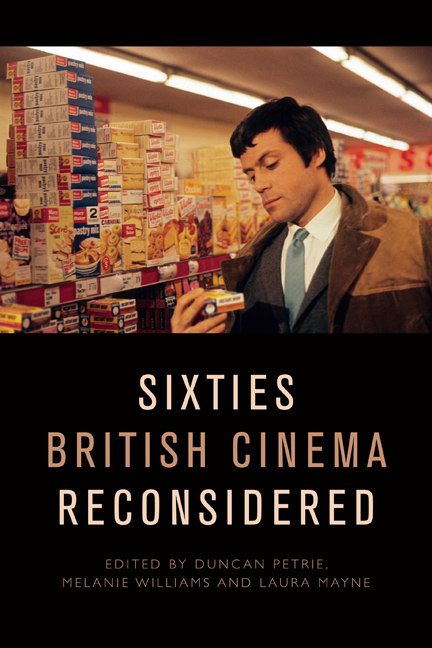Book contents
- Frontmatter
- Contents
- List of Figures and Tables
- Notes on the Contributors
- Introduction
- PART ONE STARS AND STARDOM
- 1 Male Stardom in 1960s British Cinema
- 2 ‘Rebel Rebel’?: Oliver Reed in the 1960s
- 3 Carol White: The Bardot of Battersea
- 4 ‘The Old Wave at Work’: The Transatlantic Stardom of the British Character Actress in the 1960s
- PART TWO CREATIVE COLLABORATIONS
- 5 Woodery-pokery: Charles Wood’s Sixties Screenwriting
- 6 ‘Beyond Naturalism’: Jocelyn Herbert, If . . . (1968) and Design for Performance in 1960s British Cinema
- 7 Kes: From Page to Screen
- 8 ‘I’d like to remember you as you are – as just a grumpy old man’: Joseph Losey and the Making of Figures in a Landscape (1970)
- PART THREE STYLE AND GENRE
- 9 ‘Wholesome rough stuff’: Hammer Films and the ‘A’ and ‘U’ Certificate, 1959–65
- 10 Widescreen Pyrotechnics: Shot Composition and Staging in the Cold War Films of Joseph Losey and Sidney J. Furie
- 11 The Rise and Fall of the Colourful Corporate Fantasy in 1960s British Cinema
- 12 Witchfinders and Sorcerers: Sorcery and Counterculture in the Work of Michael Reeves
- PART FOUR CULTURAL TRANSFORMATIONS
- 13 ‘An Impulse of Anger, Instantly Regretted’: Rebellion and Reaction in the Early-1960s Naval Film
- 14 Narratives of Race and Identity in Sixties British Cinema
- 15 Panic at the Disco: Brainwashing, Alienation and the Discotheque in Swinging London Films
- Index
7 - Kes: From Page to Screen
Published online by Cambridge University Press: 22 September 2020
- Frontmatter
- Contents
- List of Figures and Tables
- Notes on the Contributors
- Introduction
- PART ONE STARS AND STARDOM
- 1 Male Stardom in 1960s British Cinema
- 2 ‘Rebel Rebel’?: Oliver Reed in the 1960s
- 3 Carol White: The Bardot of Battersea
- 4 ‘The Old Wave at Work’: The Transatlantic Stardom of the British Character Actress in the 1960s
- PART TWO CREATIVE COLLABORATIONS
- 5 Woodery-pokery: Charles Wood’s Sixties Screenwriting
- 6 ‘Beyond Naturalism’: Jocelyn Herbert, If . . . (1968) and Design for Performance in 1960s British Cinema
- 7 Kes: From Page to Screen
- 8 ‘I’d like to remember you as you are – as just a grumpy old man’: Joseph Losey and the Making of Figures in a Landscape (1970)
- PART THREE STYLE AND GENRE
- 9 ‘Wholesome rough stuff’: Hammer Films and the ‘A’ and ‘U’ Certificate, 1959–65
- 10 Widescreen Pyrotechnics: Shot Composition and Staging in the Cold War Films of Joseph Losey and Sidney J. Furie
- 11 The Rise and Fall of the Colourful Corporate Fantasy in 1960s British Cinema
- 12 Witchfinders and Sorcerers: Sorcery and Counterculture in the Work of Michael Reeves
- PART FOUR CULTURAL TRANSFORMATIONS
- 13 ‘An Impulse of Anger, Instantly Regretted’: Rebellion and Reaction in the Early-1960s Naval Film
- 14 Narratives of Race and Identity in Sixties British Cinema
- 15 Panic at the Disco: Brainwashing, Alienation and the Discotheque in Swinging London Films
- Index
Summary
Barry Hines's 1968 novel A Kestrel for a Knave follows Billy Casper, a school leaver living on the edge of poverty in an unidentified northern English town. Bullied mercilessly by his brother and his classmates, Billy finds new purpose and hope through his relationship with a kestrel, Kes. In 1999, Penguin chose to re-publish the novel in its Modern Classics series, and yet the image on its front cover is of David Bradley, the star of the 1969 film Kes which was adapted for the screen by Hines, along with Ken Loach and Tony Garnett. Bradley's face is indelibly associated in the British national imaginary with a production that was ranked seventh on the BFI's list of the top 100 British films of all time, and which is marked as a foundational work of its much-admired director. While the decision to use an image from the film as the cover image is clearly justifiable for marketing reasons, it irrevocably positions the page as secondary to the screen: A Kestrel for a Knave, we are told, is the book of Kes. This privileging of film over book is symbolic of a wider failure in both academic scholarship and popular criticism to adequately register the complexities of artistic labour in works like Kes that are subject – as many films of the 1960s are – to the mythology of the auteur. This chapter will therefore aim to examine and acknowledge the role of the writer, Barry Hines, in the ecology of Kes as a means of inviting a more holistic view of convergent authorial practices in the period.
Given his status and the prolific nature of his output, Ken Loach has understandably attracted a great deal of academic attention. For example, both Jacob Leigh and John Hill have written monographs on the director, and these will be referenced in this chapter, but it is first worth examining briefly the ways in which accounts such as these have examined Hines’s roles in Kes. While Hill acknowledges that the ‘novel's themes, dialogue and structure resemble those in the film … this does not necessarily imply that Hines took the majority of creative decisions in adapting the book’, and adds of Loach that while ‘the subject of Kes comes from Hines’ imagination and experience, he (and Garnett) chose to film Hines’ novel’.
- Type
- Chapter
- Information
- Sixties British Cinema Reconsidered , pp. 115 - 130Publisher: Edinburgh University PressPrint publication year: 2020

